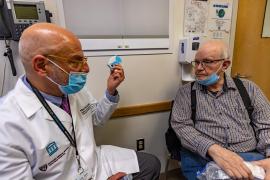Longer Looks: Brain Surgery; Reunited Brothers; Singing In The Hospital
Each week, KHN's Shefali Luthra finds interesting reads from around the Web.
The New York Times:
The Terrible Beauty Of Brain Surgery
That book was the reason I had come. It was called “Do No Harm,” and it was written by the British neurosurgeon Henry Marsh. His job is to slice into the brain, the most complex structure we know of in the universe, where everything that makes us human is contained, and the contrast between the extremely sophisticated and the extremely primitive — all of that work with knives, drills and saws — fascinated me deeply. I had sent Marsh an email, asking if I might meet him in London to watch him operate. He wrote a cordial reply saying that he seldom worked there now, but he was sure something could be arranged. In passing, he mentioned that he would be operating in Albania in August .... The procedure is used to remove a kind of brain tumor that looks just like the brain itself. Such tumors are most common in young people, and there is no cure for them. Without surgery, 50 percent of patients die within five years; 80 percent within 10 years. An operation prolongs their lives by 10 to 20 years, sometimes more. In order for the surgeon to be able to distinguish between tumor and healthy brain tissue, the patient is kept awake throughout the operation, and during the procedure the brain is stimulated with an electric probe, so that the surgeon can see if and how the patient reacts. (Karl Ove Knausgaard, 12/30)
STAT:
In Stressful Hospital Corridors, A Singing Staffer Eases Patient Anxiety
Nervous patients heading into surgery at one Boston hospital may get an extra dose of pre-op medicine: a serenade from transport worker Lindon Beckford. That is, if he can just calm his own nerves first. Beckford spends his days wheeling patients around Beth Israel Deaconess Medical Center, a 672-bed hospital in the Longwood Medical Area. Over the past three decades, he has become known for filling the hallways with song. His melodies have caught the attention of hospital staff, who have featured his performances in an employee orientation video and even called on him to sing to a patient who was about to die. (Melissa Bailey, 1/4)
USA Today:
Heart Transplants Unite Long-Lost Brothers
Aaron Arnold lay in a hospital bed, tethered to machines and gripped by fear, waiting for a new heart. Heart Transplant Coordinator Donna Dennis hoped to allay his concerns by having a former patient talk to him, and heart recipient Kenneth Arnold Catlett was happy to oblige. But as soon as Catlett opened the door, the recognition on Arnold's face was immediate, and everyone realized this was no ordinary meeting between patients. “Hey, I know this guy," Arnold exclaimed. "It’s my brother!” The two men hadn’t seen each other in about 20 years, having grown up apart, met as young adults and lost touch. (Laura Ungar, 12/29)
The Milwaukee Journal-Sentinel:
Danger Brewing For Coffee Roasters
A system that tracked patients by occupation could have helped doctors spot and prevent — decades ago — what the Journal Sentinel has now uncovered: Workers from multiple coffee plants with signs of respiratory illness that medical experts suspect could be linked to their jobs roasting and grinding coffee. The discovery is part of an ongoing investigation, Gasping for Action, that has exposed how diacetyl — a chemical known for destroying lungs of microwave popcorn workers in the early 2000s — also poses risks to coffee workers and e-cigarette users across the country. (Raquel Rutledge, 12/30)
The Atlantic:
How Doctors Are Experimenting With Cutting Health-Care Costs
Being pregnant on Obamacare has given me a close-up look at the potholes of America’s health-care system: high deductibles, redundant or unnecessary procedures that get charged against those high deductibles, and the lack of listed prices for procedures (which makes shopping for the best deal difficult), to name a few. But my pregnancy has also made me fascinated with the details of how providers, patients, and insurance companies navigate this terrain. Better still, it has exposed me to inventive ideas that are being experimented with in different parts of the country. (Ester Bloom, 12/30)
NPR's Fresh Air:
Paramedic Shares His Wild Ride Treating 'A Thousand Naked Strangers'
In the 10 years he spent driving an ambulance in Atlanta, former paramedic Kevin Hazzard rescued people from choking, overdoses, cardiac arrest, gunshot wounds and a host of other medical emergencies. He frequently found himself practicing medicine in unsafe settings, either along the side of a highway as cars whipped past, or at the scene of an assault, where either the patient or the spectators might have weapons. Podcast. (1/5)
Pacific Standard:
The Little Pink Pill That Sparked A Feminist War
Last October, the first medication designed to treat low sexual desire in women hit the market. Depending on who you believe, flibanserin (sold under the brand name Addyi) is either a safe and effective treatment for the most common form of female sexual dysfunction, or “a mediocre aphrodisiac with scary side effects.” To some, its approval by the Food and Drug Administration represented a long-overdue feminist victory for equality in sexual health; to others, it seemed like the product of a clever faux-feminist con carefully orchestrated by Big Pharma. (Maya Dusenberry, 1/5)
Vox:
The Zika Virus May Cause Birth Defects — And Experts Think It's Coming To The US
The Zika virus, a rare tropical disease that's causing a panic in Brazil — because it may lead to babies being born with abnormally small heads — has now made its way to Puerto Rico. And experts fear the mainland United States could be next. Until last year, the Zika virus, which is spread by mosquitoes, was mainly confined to Africa and Asia. But in 2015 the disease made the leap to the Western Hemisphere, affecting more than a million people in Brazil. It's since spread to Colombia, Venezuela, Mexico, and nine other countries. Last week, the first confirmed case in Puerto Rico was reported. (Julia Belluz, 1/5)






